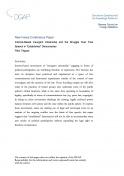Internet-based movements of “insurgent citizenship” engaging in forms of political participation are redefining freedom of expression. The Internet has since its inception been perceived and experienced as a space of free communication and democratic experiments outside of the control of state sovereignty and the sanction of the law. These founding utopias are still alive today in the practices of citizen groups who undertake some of the public sphere’s critical functions while at the same time operating at boundaries of legality, specifically in terms of communications law (e.g. press law, copyright). In doing so, these movements challenge the existing, legally enforced power balance between civil society and the state within the public sphere. To repress these movements, states are making use of legal and extra-legal tools. In an analysis of the ongoing conflict over the limits of free speech, this paper suggests that “established” democracies will not be able to accommodate these new modes of political participation without expanding the legal right to freedom of expression.
Internet-Based Insurgent Citizenship
Félix Tréguer on the Struggle Over Free Speech in “Established” Democracies
The Internet, with its utopian roots and emphasis on free communication and democratic experiments, has inspired new kinds of “citizenship practices,” some of which operate at the edge of legality, specifically in terms of communications law. Their challenges to the existing power balance between civil society and the state has elicited a range of responses.
Web links
Bibliographic data
Tréguer, Félix. “Internet-Based Insurgent Citizenship.” November 2014.New Faces Conference Paper, 2014, 9 pp.

